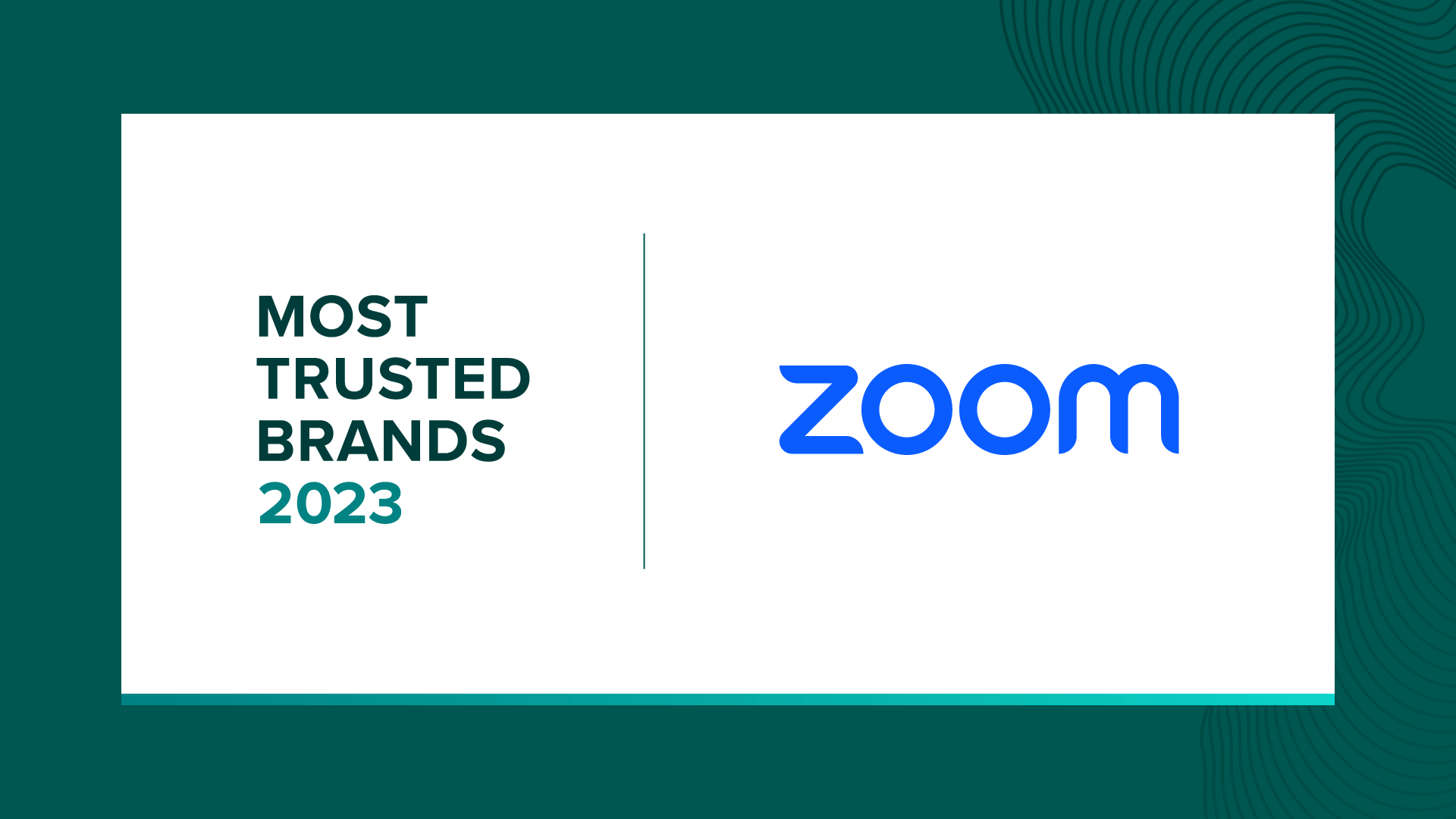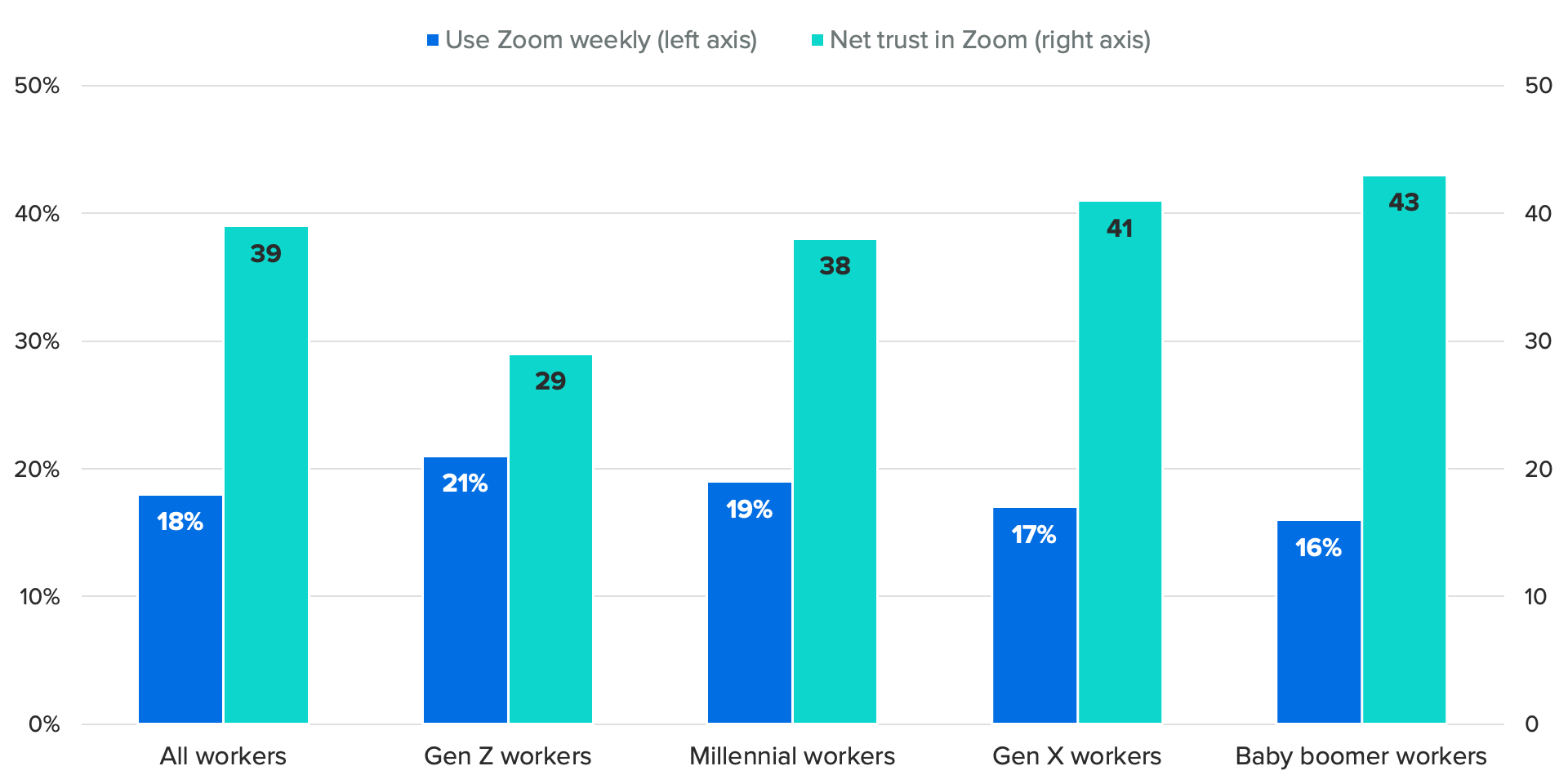Zoom Is Among Tech’s Most Trusted Brands, Despite Steep Competition and Remote Work Shifts

Key Takeaways
Zoom’s role in helping companies quickly adapt to remote work built trust and goodwill among consumers and managers at companies.
Despite high levels of trust among consumers, investor confidence in the company has diminished substantially as Zoom faces tough competition and the future of remote work remains uncertain.
Zoom’s challenge now is to convert its goodwill into brand loyalty.
This analysis pulls from our Most Trusted Brands 2023 report, our yearly effort highlighting the brands that have secured consumer trust around the world. Download the report.
Three years after the beginning of the pandemic lockdowns, Zoom is not only a household name but a verb in and of itself, usurping Skype as the genericization for videoconferencing someone. Its ubiquity in our professional lives — as well as our social lives during the lockdown periods — is one of the reasons it’s the No. 10 most trusted tech brand in the United States this year.
However, Zoom’s future success is anything but certain. Zoom’s stock went into freefall after flying high at around $568 a share in October 2020, and trades closer to $70 a share at the time of writing. The company is now facing a couple of major obstacles.
Zoom’s stiff competition from Google and Microsoft
The first challenge is the competition from Google Meet, Microsoft Teams and other workplace communication services. The abrupt shift to total remote work for office workers during the pandemic initially set Zoom up for success with its ready-out-of-the-box videoconferencing solution for companies trying to manage this change: The company reported that its number of daily meeting participants grew from 10 million in December 2019 to 300 million in April 2020. But Zoom’s growth forced Google, Microsoft, and others to innovate quickly and make enhancements to their own videoconferencing products to catch up to some of Zoom’s features.
Take, for example, Microsoft Teams’ rise to prominence. In March 2020, as the lockdowns started in the United States, 24% of workers said they had “a lot” or “some” trust in the Zoom brand, and 40% said the same for Microsoft Teams. Three years later, 55% said they trusted Zoom and 47% said they trusted Microsoft Teams. This indicates two things: First, that Zoom built significant goodwill with managers during the lockdowns, and second, that Microsoft Teams was able to hold its ground not only in terms of engagement with the Teams platform, but the brand’s reputation as well.
Trust in Zoom Has Doubled Since the Onset of Pandemic Lockdowns
How changes in remote and hybrid work may impact Zoom
The second challenge for Zoom is the diminishing number of remote workers in the United States. According to a Morning Consult report, 35% of employed U.S. adults work remotely or in hybrid situations, and an even larger share (52%) said they would prefer to work remotely or in a hybrid environment, though this number has declined since 2022. If remote work continues to erode, this trend could be a problem for Zoom as virtual meetings are gradually supplanted with more in-person meetings.
Diving deeper, Zoom could also start facing obstacles among the youngest working cohorts. According to the same report, Gen Z adults who worked remotely were more likely than employed adults overall to say that communicating with their manager is harder when away from the office (32% vs. 26%). By generation, Gen Z workers were also the most likely to report using Zoom on a weekly basis (21%) — likely because students also report high weekly usage of Zoom — yet they have the lowest share of net trust in the platform (29 percentage points). Granted, trust in brands among Gen Z in particular is a tricky issue, as Gen Z has the lowest levels of trust in brands overall.
Gen Z Workers Least Likely to Trust Zoom

In the scenario where remote work continues its downward trend, the importance of videoconferencing would also diminish over time, but the value of a greater workplace productivity suite — including instant messaging, cloud storage and collaborative documents — would remain the same. As such, Zoom is moving toward what it calls “Zoom One,” a unified one-stop-shop for productivity that would compete not only on videoconferencing but every other facet of workplace digital communication in a bid to contend with Google Workspace and Microsoft 365.
Zoom continues to do well with workers at the manager and above levels
But there’s good news. Despite the platform’s struggles with investors and the tough competitive environment, trust in Zoom among consumers remains high and is even on the rise. Workers at manager level and above are particularly fond of Zoom, with more than 40% saying earlier this year that they would consider buying from Zoom.
Zoom Trust and Purchase Intent Remain High Among Company Managers
Purchase intent is just as high as we climb up the corporate ladder. Over the past 12 months, 55% of those at vice president level and above said they would buy from the platform. These shares increase with organization size. Not only is this notable for the obvious reason — i.e., those with decision-making authority at their organizations would consider buying from Zoom — but the trust that has been built with people managers over the past few years demonstrates that the product is proven and remains important for their work.
Share Who Trust Zoom Is High Among Company Executives
Zoom has built a lot of goodwill with managers who quickly needed to adapt their direct reports to remote work. The company’s task now is to translate those feelings into brand loyalty.
Jordan Marlatt previously worked at Morning Consult as a lead tech analyst.

